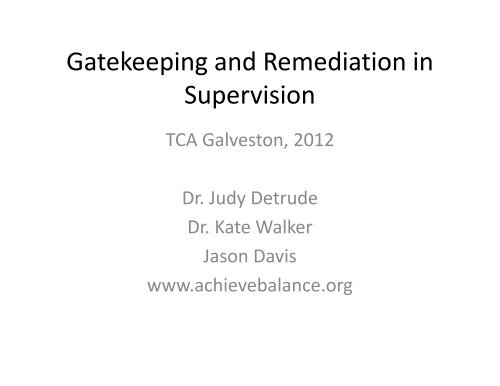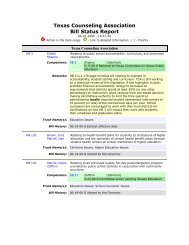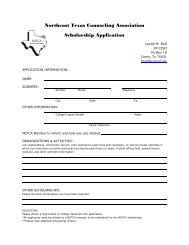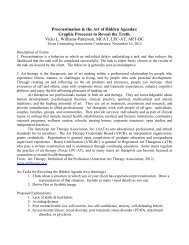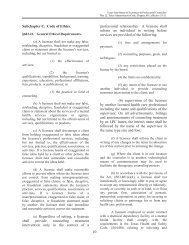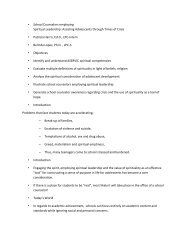Gatekeeping and Remediation in Supervision
Gatekeeping and Remediation in Supervision
Gatekeeping and Remediation in Supervision
Create successful ePaper yourself
Turn your PDF publications into a flip-book with our unique Google optimized e-Paper software.
<strong>Gatekeep<strong>in</strong>g</strong> <strong>and</strong> <strong>Remediation</strong> <strong>in</strong><strong>Supervision</strong>TCA Galveston, 2012Dr. Judy DetrudeDr. Kate WalkerJason Daviswww.achievebalance.org
Def<strong>in</strong><strong>in</strong>g <strong>Remediation</strong> <strong>and</strong> <strong>Gatekeep<strong>in</strong>g</strong>• <strong>Gatekeep<strong>in</strong>g</strong>– A responsibility exists– A protection factor• <strong>Remediation</strong>– Corrective, restore, heal<strong>in</strong>g
Evaluation <strong>and</strong> <strong>Remediation</strong> ofStudents (F9)• Counselors clearly state to students, prior to<strong>and</strong> throughout the tra<strong>in</strong><strong>in</strong>g program, thelevels of competency expected, appraisalmethods, <strong>and</strong> tim<strong>in</strong>g of evaluations for bothdidactic <strong>and</strong> cl<strong>in</strong>ical competencies. Counseloreducators provide students with ongo<strong>in</strong>gperformance, appraisal <strong>and</strong> evaluationfeedback throughout the tra<strong>in</strong><strong>in</strong>g program.
Responsibility of CE Programs• 1. evaluation of students has to be ongo<strong>in</strong>g;done with each course/or each semester• 2. students need to receive timely feedback• 3. committee decisions versus the decision ofone professor
Limitations• Counselor educators, throughout ongo<strong>in</strong>gevaluation <strong>and</strong> appraisal are aware of <strong>and</strong>address the <strong>in</strong>ability of some students toachieve counsel<strong>in</strong>g.• 1. Assist students <strong>in</strong> secur<strong>in</strong>g remedialassistance when needed.• 2. Seek professional consultation <strong>and</strong>document their decision to dismiss or referstudents for assistance <strong>and</strong>
Limitations cont.• 3. Ensure that students have recourse <strong>in</strong> atimely manner to address decisions to requirethem to seek assistance or to dismiss them<strong>and</strong> provide students with due process.• H<strong>and</strong>books expla<strong>in</strong> step by step how theprocess if to work.
Counsel<strong>in</strong>g for Students• If students request counsel<strong>in</strong>g or if counsel<strong>in</strong>gservices are required as part of a remediationprocess, counselor educators provideacceptable referrals.• Students concerned aboutprivacy/confidentiality if they access campusfacilities.
• What k<strong>in</strong>ds of student issues did you see <strong>in</strong>your graduate programs?
<strong>Gatekeep<strong>in</strong>g</strong> <strong>and</strong> <strong>Remediation</strong> atUniversities• Types of Problems– Academic– Personal issues, crises with families– Emotional/mental <strong>in</strong>stability– Lack of underst<strong>and</strong><strong>in</strong>g of confidentiality– Substance abuse issues
• Responses of Counselor Education Programs– Academic issues – retake courses; redoassignments– Personal issues – take a semester off, give<strong>in</strong>complete grades; counsel<strong>in</strong>g– Emotional/mental <strong>in</strong>stability – require counsel<strong>in</strong>g;assess if student’s clients are at risk; assess ifproblem is chronic or situational– Confidentiality – remedial work; possible dismissal
• Adm<strong>in</strong>istrative Issues – look at problems froman adm<strong>in</strong>istrative viewpo<strong>in</strong>t versus aprofessional code• Concern for enrollment• Concern for lawsuit from student
Examples of <strong>Remediation</strong>• 1. a student could not <strong>in</strong>teract with clients <strong>in</strong> thepracticum; given an F <strong>and</strong> had to take the courseover; failed the course a second time result<strong>in</strong>g <strong>in</strong>dismissal from the program• 2. a s<strong>in</strong>gle-parent mom work<strong>in</strong>g full time, driv<strong>in</strong>gan hour to class <strong>and</strong> f<strong>in</strong>d<strong>in</strong>g sitters for four youngchildren. The quality of the work decreased,asked to take a semester off, was very angry butcomplied. Came back the next semester <strong>and</strong> wassuccessful <strong>and</strong> also grateful for the remediation.
Consequences for Universities• 1. If they do dismiss a student• 2. If they do not dismiss a student
My own experience• 1. a transgender student• 2. a student who was a danger to faculty <strong>and</strong>other students• 3. students us<strong>in</strong>g alcohol
Court Cases with Counselor EdPrograms• 1. tell<strong>in</strong>g a student she had to work with ahomosexual client if she wanted to stay <strong>in</strong> theprogram• 2. transferr<strong>in</strong>g a homosexual client from onestudent to another• 3. a student graduated from a program, didharm to the client, the client’s family sued theuniversity because they had let the counselorgraduate
Case – Eastern Michigan University,2009• Federal lawsuit aga<strong>in</strong>st Eastern Michigan filed by a federallegal group• University dismissed the student for her beliefs onhomosexuality; the student followed the supervisor’s advice<strong>and</strong> referred the client to another counselor who did not havea conscience issue with homosexuality• The orig<strong>in</strong>al counselor was told she had to undergoremediation to change her beliefs as they relate tohomosexual clients. She refused remediation, was given aformal hear<strong>in</strong>g <strong>and</strong> then dismissed by the university.
Case – Augusta State University 2010• University required a student to accepthomosexuality. The student argued <strong>in</strong> alawsuit that she was threatened withexpulsion if she did not change her beliefs onhomosexuality.• She was given remediation <strong>and</strong> refused tocomply.– Attend workshops, read articles– Write reports to her advisor
Jason’s research
<strong>Gatekeep<strong>in</strong>g</strong> <strong>and</strong> <strong>Remediation</strong> Post• Types of IssuesGraduation– 1. refus<strong>in</strong>g to follow directives from supervision• Homework, outside consultation• Call CPS, take appropriate steps for suicidal client– 2. withhold<strong>in</strong>g <strong>in</strong>formation from the supervisor– 3. not follow<strong>in</strong>g ethical/legal codes (lack ofknowledge)– 4. purposely not follow<strong>in</strong>g ethical/legal codes– 5. tak<strong>in</strong>g on cl<strong>in</strong>ical issues with no tra<strong>in</strong><strong>in</strong>g
<strong>Remediation</strong> Requirements Post Grad• §681.93. Supervisor Requirements.e(4) If a supervisor determ<strong>in</strong>es that the LPCIntern may not have the counsel<strong>in</strong>g skills orcompetence to practice professionalcounsel<strong>in</strong>g under a regular license, thesupervisor shall develop <strong>and</strong> implement awritten plan for remediation of the LPC Intern.
“Shall”• a —used to express a comm<strong>and</strong> orexhortation • b —used <strong>in</strong> laws, regulations, or directives toexpress what is m<strong>and</strong>atory http://www.merriam-webster.com/dictionary/shallDownloaded October 29, 2012
Supervisors <strong>and</strong> Their Responses toIssues• 1. depend<strong>in</strong>g on the issue, supervisors feelvulnerable, deceived, lied to• 2. have to decide if the relationship can besaved• 3. have to decide if the supervisee can behelped• 4. have to decide if they want to remediate,term<strong>in</strong>ate
• What k<strong>in</strong>ds of post graduate supervisionissues have you experienced or heard about?
Before <strong>Remediation</strong>Are you sure you have been clear?• Def<strong>in</strong>e supervision expectations– <strong>Supervision</strong> Contract• Def<strong>in</strong>e adm<strong>in</strong>istrative expectations (if applicable)– Adm<strong>in</strong>istrative Contract– Policy <strong>and</strong> Procedures Manual• Def<strong>in</strong>e specific behaviors for counsel<strong>in</strong>g <strong>and</strong>supervision – what is cl<strong>in</strong>ical competence– SPAI– Self-evaluation
Before <strong>Remediation</strong>• Are your expectations appropriate todevelopmental stage?• Have you def<strong>in</strong>ed ‘exceeds expectations’ ‘meetsexpectations’ ‘does not meet expectations’?• Are there boundary or dual relationship issues?– Friend– Work colleague (former or current)– Student
<strong>Remediation</strong> Steps• If supervisor decides to remediate:– Use written document that describes the problem– Clearly state what the remediation will be– Provide expectations of when remediation will becompleted– State what will happen if remediation is notcompleted. Will additional remediation beconducted or will lack of completion result <strong>in</strong>term<strong>in</strong>ation.– Make sure that both the supervisor <strong>and</strong>supervisee sign the document <strong>and</strong> date it
LPC <strong>and</strong> LMFT <strong>Remediation</strong>• On the websites:• Additional hours of supervision• Take workshops on specific issues, example bill<strong>in</strong>gpractices or be assigned to a practice wheresomeone will teach the correct bill<strong>in</strong>g practice• Determ<strong>in</strong>ed by:– Severity of the offense, the history of previousviolations, efforts made to correct the violation, theharm to the victim, the likelihood of repeat violations
Other Systems Involved• If they work <strong>in</strong> a place different from you– Be sure to have a release of <strong>in</strong>formation for thesite supervisor; need to have cooperation <strong>in</strong> orderto secure the safety of clients– If they are <strong>in</strong> group supervision, do the othermembers of the group need to know; is it ateach<strong>in</strong>g moment
Jason’s Research
Examples• 1. breach of confidentiality• 2. be<strong>in</strong>g lied to about report<strong>in</strong>g child abuse• 3. work<strong>in</strong>g harder than the supervisee
Consequences for Supervisors• 1. If they keep work<strong>in</strong>g with the supervisee• 2. If they term<strong>in</strong>ate the contract with thesupervisee
Issues of Term<strong>in</strong>ation• What issues would result <strong>in</strong> immediateterm<strong>in</strong>ation of the supervisory agreement?• One supervision group:– Sexual relationship with a client– Lack of disclosure when they did someth<strong>in</strong>g
Resources• TX LPC Code of Ethics• TX LMFT Code of Ethics• ACA Code of Ethics• TCA Code of Ethics• Onl<strong>in</strong>e course <strong>Gatekeep<strong>in</strong>g</strong> <strong>and</strong> <strong>Remediation</strong><strong>in</strong> Counsel<strong>in</strong>g; Achieve Balance
For More InformationContact Dr. Judy DeTrude, Jason Davis, <strong>and</strong> Dr. Kate Walker atAchievebalance.org936-697-2822Visit www.achievebalance.org for our Supervisor Toolkit <strong>and</strong> more valuablesupervisor resources.


